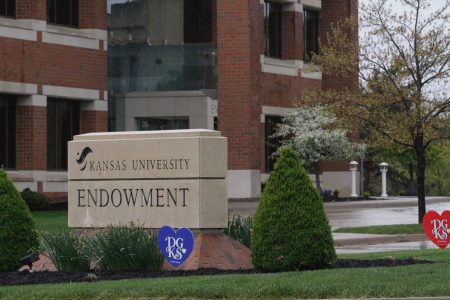Regents committee recommends 10 low-volume KU degree programs should continue; all to be placed on improvement plans

photo by: Contributed
The roof on Wescoe Hall has an 80-foot "KU" in this file photo from 2021.
Look to current events in the Middle East for evidence of whether a degree in Jewish Studies might be useful in today’s world. But on Tuesday, its place in the world wasn’t in question.
Its place at the University of Kansas was.
A key committee of the Kansas Board of Regents on Tuesday recommended that Jewish Studies and nine other programs that suffer from some combination of low enrollment, low pay or low employer interest should continue at KU.
But the next three years for several of those programs could be critical. Members of the Regents’ Academic Affairs Committee on Tuesday said if key metrics for the degrees don’t improve, they could each face a vote in 2027 to phase out the degree programs or merge them with other departments at KU.
“I don’t want to see those courses go away completely,” Regent Diana Mendoza said. “I think they are valuable. I think we need to continue to offer those opportunities to students. But I also feel like we need to be efficient in how we allocate our resources as we talk about tuition increases and those type of things.”
The other nine programs were degrees within: African Studies, American Studies, International/Globalization Studies, Religious Studies, Astronomy, Atmospheric Science and Meteorology, Geography, Music, and Engineering Physics. All of those programs, plus Jewish Studies, are recommended to go on the equivalent of a three-year improvement program.
The degree programs are expected to meet at least three of four benchmarks that the Regents have set for all undergraduate degree programs. Those benchmarks are related to the number of junior- and senior-levels students in the program, the number of degrees awarded, the number of students who remain in Kansas employed in the field, and median wages for recent graduates in the field.
Three programs were noted by Regents as falling particularly short in multiple benchmarks. Jewish Studies, African Studies and Astronomy each met no more than one of the benchmarks. All suffered from low degree numbers. The four-year rolling average for degrees awarded in Jewish Studies was 3.5, in African Studies 4.25 and in Astronomy 4.75.
But KU leaders expressed concern about some of the benchmarks. Provost Barbara Bichelmeyer said KU’s status as a major research institution should be better reflected in the benchmarks.
For example, both Jewish Studies and African Studies receive millions of dollars in federal funding, in part because the U.S. military relies on KU to teach a host of foreign languages to military officers from across the country. Those officers often receive military schooling at Fort Leavenworth, and receive language instruction from KU faculty members on everything from Yiddish to Swahili.
Bichelmeyer confirmed that Jewish Studies, African Studies and Religious Studies — despite having relatively low enrollments — are not operating at a financial deficit for KU, due to the federal dollars that they receive.
Some Regents, though, pushed back on whether KU could merge the degree programs with other similar academic programs and still keep its federal funding intact. Bichelmeyer countered that such mergers can make faculty recruitment difficult. The top researchers want to be in programs that are entirely devoted to their academic field. Attracting top researchers is a major factor in attracting federal funding, Bichelmeyer said.
“They are some of the best programs in the country,” Bichelmeyer said of the KU programs that are attracting defense dollars to teach foreign languages.
Bichelmeyer told Regents on Tuesday that KU, just in the last few weeks, has received a $1.6 million donation to create a new distinguished professorship within the Jewish Studies department. Donors, she said, often are more willing to give to programs if they stand alone versus being a smaller part of a larger degree program.
Bichelmeyer also said some programs — Astronomy is an example — are hurt by the metrics because so many of that degree’s graduates go on to get an advanced degree rather than immediately entering the workforce. One of the Regents’ key metrics is employment levels one year after graduation.
Bichelmeyer, in a brief interview with the Journal-World, said getting at issues like those would be important to KU. Otherwise, the university may find itself often defending degree programs that don’t meet the Regents’ metrics.
“How do we value programs that advance critical knowledge development, talent development and are key areas for security and innovation in the country?” Bichelmeyer asked.
She said she would like the Regents to come up with metrics that recognize a major research university may have some smaller degree programs that tie into larger missions of the university.
“Some things we do are just more for research and economic development, but we try to bring them all together and be as efficient as we can,” she said.
Tuesday’s vote is not the final word on the subject. The full Kansas Board of Regents at its June 20 meeting will be asked to approve the recommendations of the Academic Affairs Committee. The full board historically is very deferential to the recommendations of the committee, however. The Academic Affairs Committee made recommendations on degree programs for the other five public universities that the Regents oversee. In total, 31 degree programs were reviewed, and nearly all were recommended to be kept, but placed on three-year improvement plans.







